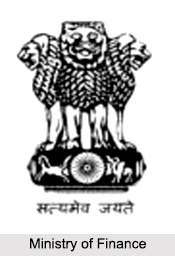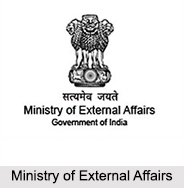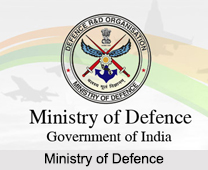 Indian Ministries are very essential in the organizational set up of the Government of India and in the organization of the country. The term `ministry` came into vogue only after Independence in 1947. The Constitution of India requires that the Indian President shall make rules for the allocation of business amongst ministers. This is the root of the portfolio system, and the concept of a ministry springs from this system. The administrative organization which assists the minister to deal with the subjects allotted to him is known as the Ministry. The Ministry may include one or more departments, depending upon administrative convenience, each under the charge of a secretary.
Indian Ministries are very essential in the organizational set up of the Government of India and in the organization of the country. The term `ministry` came into vogue only after Independence in 1947. The Constitution of India requires that the Indian President shall make rules for the allocation of business amongst ministers. This is the root of the portfolio system, and the concept of a ministry springs from this system. The administrative organization which assists the minister to deal with the subjects allotted to him is known as the Ministry. The Ministry may include one or more departments, depending upon administrative convenience, each under the charge of a secretary.
Different Indian Ministries
A notable feature has been the phenomenal growth in the size of the machinery of the central government, since Independence. At the time of the transfer of power to India in 1947, the work of the government was carried out by the 18 ministries. Comparatively, this number has increased by leaps and bounds. Some of the Indian Ministries are Ministry of Finance, Ministry of External Affairs, Ministry of Defence, Ministry of Information and Broadcasting, Ministry of Civil Aviation, Ministry of Home Affairs, Ministry of Law and Justice, Ministry of Consumer Affairs, Food and Public Distribution, Ministry of Agriculture, Ministry of Women and Child Development, Ministry of Personnel, Public Grievances and Pensions, Ministry of Food Processing Industries, Ministry of Environment and Forests, Ministry of Coal, Ministry of Mines, Ministry of Earth Sciences, Ministry of Tourism, Ministry of Steel, Ministry of Textiles and Ministry of Urban Development. The number of ministries and departments changes from time to time.
Some of the Indian Ministries are Ministry of Finance, Ministry of External Affairs, Ministry of Defence, Ministry of Information and Broadcasting, Ministry of Civil Aviation, Ministry of Home Affairs, Ministry of Law and Justice, Ministry of Consumer Affairs, Food and Public Distribution, Ministry of Agriculture, Ministry of Women and Child Development, Ministry of Personnel, Public Grievances and Pensions, Ministry of Food Processing Industries, Ministry of Environment and Forests, Ministry of Coal, Ministry of Mines, Ministry of Earth Sciences, Ministry of Tourism, Ministry of Steel, Ministry of Textiles and Ministry of Urban Development. The number of ministries and departments changes from time to time.
Functions of Indian Ministries
 Each Ministry is responsible for dealing with subjects allotted to it under the Business Rules made by the President in 1966. The allotment is done by the President on the advice of the Indian Prime Minister. There are rules which specify cases or classes of cases to be submitted to the President, the Prime Minister, the Cabinet or its committees for prior approval. The rules also specify the circumstances in which the department primarily concerned with the business under disposal will have to consult other departments concerned and secure their concurrence before taking a formal decision.
Each Ministry is responsible for dealing with subjects allotted to it under the Business Rules made by the President in 1966. The allotment is done by the President on the advice of the Indian Prime Minister. There are rules which specify cases or classes of cases to be submitted to the President, the Prime Minister, the Cabinet or its committees for prior approval. The rules also specify the circumstances in which the department primarily concerned with the business under disposal will have to consult other departments concerned and secure their concurrence before taking a formal decision.
The ministries are essentially responsible for the formulation of policies as well as their execution, within the spheres. Their functions include assisting the Minister in policy making and its periodical review, framing legislation and rules and regulations, sectoral planning and programme formulation, budgeting and control of expenditure with respect to activities and accordingly securing administrative and financial approval for operational programmes and plans and their subsequent modifications. They also supervise and control the execution of policies and programmes by the executive departments or semi-autonomous field agencies and evaluate the results. They are involved in the coordination and interpretation of policies, assisting other branches of Government, maintaining contact with state administrations, initiating measures to develop greater personnel and organizational competence both in the secretariat and its executive agencies and assisting the minister in the discharge of his parliamentary responsibilities.






